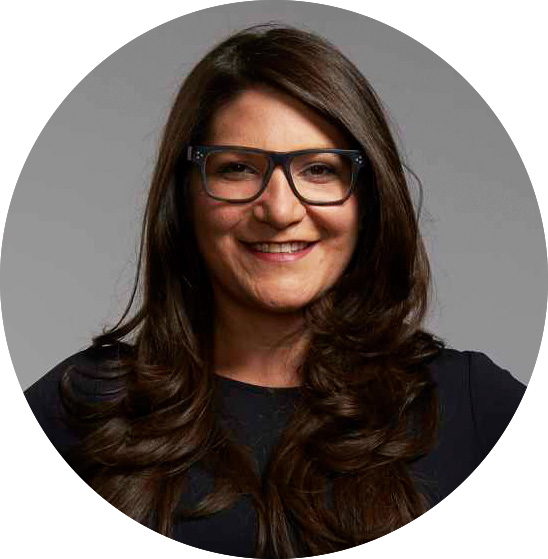

Finovate’s celebration of Women’s History Month continues with this conversation with Meghan Lapides, who recently became Chief People Officer for SmartAsset.
Founded in 2012, SmartAsset is an online hub for consumer-focused financial information and advice. The company reaches approximately 75 million people each month via its educational content, personalized financial calculators, and other tools. SmartAsset also powers SmartAdvisor, a nationwide marketplace that helps connect consumers with financial advisors.
We caught up with Ms. Lapides to discuss her goals as Chief People Officer, the evolution of human resources and talent management in the tech industry, and how a smart “People strategy” can help companies grow.
Why did you decide to take the opportunity to be Chief People Officer for SmartAsset?
Meghan Lapides: SmartAsset’s mission of helping people get better financial advice really spoke to me. Planning for your future is incredibly important and many people start late. Being part of a company that helps people think smartly and early about financial planning is something that aligns with my personal mission of helping people. When I met the leadership team and members of the People team, I knew this was the place for me. Their passion and intelligence combined with our CEO’s vision was the right combination of factors that confirmed my decision to join SmartAsset.
Is SmartAsset your first fintech? Is there anything unique about building a People strategy in fintech compared to other tech companies you have worked for?
Lapides: Yes, SmartAsset represents my first professional experience in the fintech space! One of the things I love about Human Resources is that when you change companies you get the opportunity to learn an entirely new industry. I love what I do, so I find it exciting to be doing what I love and applying my expertise in a completely new environment. I’ve been lucky to work in multiple different industries, including enterprise SAAS, consumer, and professional services, as well as different fields, such as advertising, public relations, technology, and fashion, so I’ve embraced these opportunities to learn something new. When I was considering my next move, I was interested in companies that were in the fintech space and also mission driven – SmartAsset was both of those things! I also wanted another professional opportunity to be a part of building something great, impactful, and meaningful. I’m thrilled that SmartAsset checked all of those boxes and honored that they selected me to oversee and scale their People department.
How has talent acquisition and management changed over the years that you have been involved in human resources?
Lapides: It’s wild to think about it now, but in my first recruiting coordinator role, we didn’t have an Applicant Tracking System. We used paper files to track candidates and I typed the labels for those files on a typewriter! We went from antiquated processes like that to new intelligent systems that help source great candidates and mitigate bias while offering data collection and analysis to iterate and improve on processes that make the most impact. “Data Fuels Our Decisions” is one of SmartAsset’s core values, and I’m happy that today’s HR systems allow us to make informed decisions in an efficient and timely manner.
When I was thinking of going into HR after studying to be a Marriage & Family Counselor in college, I spoke to a family friend who was the COO of a huge company about whether or not it was the right move. He told me that “Personnel was not for me. I was too creative for that.” We still joke that I have spent the last 20 years proving him wrong.
I’ve been lucky to work for progessive, people-centric organizations, but I’ve seen a huge increase in flexibility and creativity when it comes to managing talent. But more than that, especially post-pandemic, the People team not only has a seat at the table, but also we are key influencers in setting the strategy for the company’s most valuable resource: its people. The intersection of the business and our people is where our team sits and the two can’t be successful without the other. Highly engaged, happy and healthy employees build strong businesses. Businesses that allow people to make an impact internally and externally are the ones that attract the best talent. I am energized by being able to spend my time focusing on building a strong business and a culture that gives our Assets the best chance of success and allows our employees to grow.

What is most important to you in terms of leadership development within a company?
Lapides: Openness and shared vision. We all know how important mission, vision, and values are in building culture – but it’s very important for leadership to have a shared vision on what leadership looks like and how you can support each other to be successful from both the top down and the bottom up. I also think in order for a company to be truly successful – and have a highly engaged workforce – you need to have the openness to create a place where people can come as they are, lead as they are, and celebrate diversity in all forms.
What role can diversity and inclusion policies play to help drive growth and expansion?
Lapides: When you are creating products and services for the world, you need to look like the world you are creating it for. Studies show that the more diverse companies are, typically the more successful they are. But DEI is way more important than financial success. It helps DEI and company expansion to remove barriers to entry, reduce bias, open your recruiting pipeline, and create a safe, open, and equitable culture. When it comes to retaining your best talent, companies must ensure that their workplace allows people to be themselves, engage in real world events and issues, and also create a culture of belonging.
SmartAsset made the decision to remain a remote-first company. This helps our DEI strategy because it removes geographical barriers and helps us to be more accommodating of diverse work styles. Being a remote-first company further allows us to hire talent more quickly to support our rapid expansion given the fact that there are fewer geographic barriers.
What are some of the challenges a People strategy faces as businesses get bigger? How do companies overcome or manage them?
Lapides: Scaling a company is a huge challenge. Processes that worked at 50, 100, or 200 employees don’t always hold up at 500, 1,000, or 2,000. People teams also tend to run lean at a startup, so it’s really important to put talent behind that team – especially as you scale – to ensure the needs of your employees are met and you can get ahead of big projects and initiatives.
Are there any other issues you think might be worth highlighting about your new role?
Lapides: SmartAsset is a remote-first company, which is incredibly exciting because it allows us to hire the best talent wherever they are in the country. However, that comes with challenges as well. We are looking for opportunities to focus on asynchronous workflows to allow people to do their best work in their own time zones, but also have the ability to collaborate across different teams. We are focused on allowing the flexibility for both independent work and cross collaboration, and creating an environment that allows people to build relationships, focus on what is important, further build our culture, and continue to do great work.
Photo by Pavel Danilyuk from Pexels